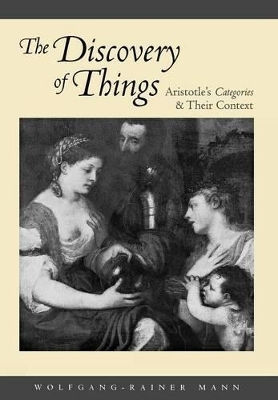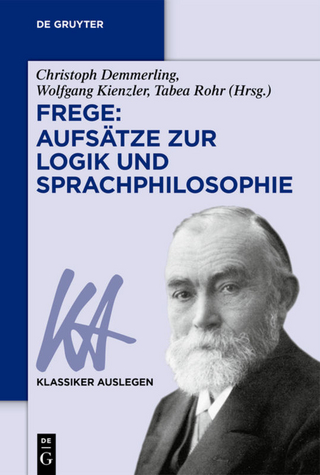
The Discovery of Things
Princeton University Press (Verlag)
978-0-691-01020-5 (ISBN)
Aristotle's Categories can easily seem to be a statement of a naive, pre-philosophical ontology, centered around ordinary items. Wolfgang-Rainer Mann argues that the treatise, in fact, presents a revolutionary metaphysical picture, one Aristotle arrives at by (implicitly) criticizing Plato and Plato's strange counterparts, the "Late-Learners" of the Sophist. As Mann shows, the Categories reflects Aristotle's discovery that ordinary items are things (objects with properties). Put most starkly, Mann contends that there were no things before Aristotle. The author's argument consists of two main elements. First, a careful investigation of Plato which aims to make sense of the odd-sounding suggestion that things do not show up as things in his ontology. Secondly, an exposition of the theoretical apparatus Aristotle introduces in the Categories--an exposition which shows how Plato's and the Late-Learners' metaphysical pictures cannot help but seem inadequate in light of that apparatus. In doing so, Mann reveals that Aristotle's conception of things--now so engrained in Western thought as to seem a natural expression of common sense--was really a hard-won philosophical achievement.
Clear, subtle, and rigorously argued, The Discovery of Things will reshape our understanding of some of Aristotle's--and Plato's--most basic ideas.
Wolfgang-Rainer Mann is Associate Professor of Philosophy at Columbia University.
Acknowledgments ix A Note on Citations xi INTRODUCTION 3 1. The Project 3 2. The Problem 6 3. The Task of Part I: The Problem of Categories 1 and 2 23 4. The Task of Part II: Plato's Metaphysics and the Status of Things 28 5. The Task of Part III: The Categories Once More--The Role of the '-onymies' 35 6. Final Methodological Preliminaries 36 PART I SETTING THE STAGE: THE "ANTEPRAEDICAMENTA" AND THE "PRAEDICAMENTA" 39 1. Preliminary Remarks: The Role of the First Two Chapters of the Treatise 39 2. The Definition of the '-onymies' 43 3. The Four Kinds of Eponymy 48 4. The Distinctions of Chapters 2 and 3 50 Appendix 1: Difficulties with the Received Text and a Role for Chapter 4 58 Appendix 2: Speusippus, the Speusippean '-onymies', and Topics I, 15 69 PART II. PLATO'S METAPHYSICS AND THE STATUS OF THINGS 75 1. Preliminary Remarks 75 2. Forms and Participants in Plato's Middle Dialogues 76 3. The Problem of Becoming 84 4. Three Difficulties for the Proposed Account of Becoming 89 5. Plato's Introduction of the Distinction between Being and Becoming 91 6. The Background to Plato's Special Use of 'Becoming' 98 7. The Participants: Plato and Anaxagoreanism 107 8. Self-Predication 120 9. The Being of the Participants: Preliminaries 124 10. The First Objection: Does Plato Distinguish between Essential and Accidental Properties? 127 11. The Second Objection: The Extent of Forms (and a Methodological Digression) 133 12. The Second Objection Continued: Forms and 'Incompleteness' 139 13. A Third Objection: Can Forms Be 'Ingredients'? 148 14. The Participants: Being and Becoming 157 15. The Late-Learners: Real Being for Ordinary Things 172 16. Does Plato Modify His Picture in Some Late Dialogues? 180 PART III. THE CATEGORIES PICTURE ONCE MORE: AN ALTERNATIVE TO PLATONISM AND LATE-LEARNERISM 184 1. Aristotle's Introduction of Paronymy 184 2. Some Difficulties 193 3. The "Antepraedicamenta" as an Introduction to the "Praedicamenta": The Project of the Categories Reconsidered 195 EPILOGUE 205 Select Bibliograpby 207 Index Locorum 219 Index Rerum 226
| Erscheint lt. Verlag | 13.3.2000 |
|---|---|
| Zusatzinfo | 1 table, 6 line illus. |
| Verlagsort | New Jersey |
| Sprache | englisch |
| Maße | 197 x 254 mm |
| Gewicht | 482 g |
| Themenwelt | Geisteswissenschaften ► Philosophie ► Logik |
| Geisteswissenschaften ► Philosophie ► Metaphysik / Ontologie | |
| Geisteswissenschaften ► Philosophie ► Philosophie Altertum / Antike | |
| ISBN-10 | 0-691-01020-X / 069101020X |
| ISBN-13 | 978-0-691-01020-5 / 9780691010205 |
| Zustand | Neuware |
| Informationen gemäß Produktsicherheitsverordnung (GPSR) | |
| Haben Sie eine Frage zum Produkt? |
aus dem Bereich


